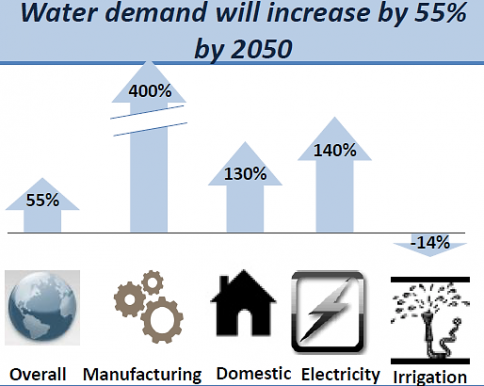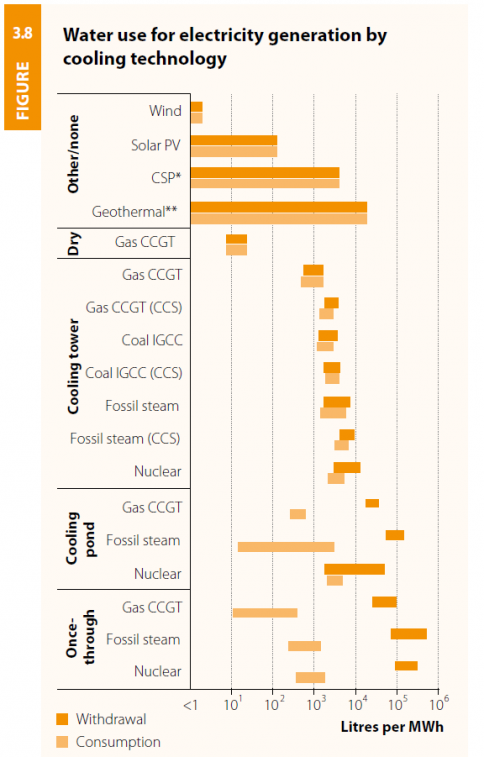The Lima-Callao area has a population of 9 million andan economy worth US$66 billion in 2014. The preliminary results of our research indicate that the total energy bill for the city was US$4.7 billion and that the bill for waste and water was US$50 billion - meaning that 8% of everything earned in the local economy was spent on energy, water and waste.
Energy and Water
Water is intrinsically linked with energy.
- 8% of the world’s energy is used for treating water and waste, pumping water and distributing water for human and industrial consumption (UNESCO, 2012)
- 19% of water worldwide is used by industry to generate power from pumped hydroelectric, geothermal and nuclear energy but 90% of global power generation is water intensive (United Nations, 2014)
- As increasing access to electricity is a clear priority for many emerging economies (Asian Development Bank, 2013), water consumption will have to increase as a result.

Source: OECD (2011) Water: The Outlook to 2050
- OECD (2011) forecasts that by 2050 a subsequent 55% increase in world water demand as a result of a world population of around 10 billion people
- Our future challenge will be to provide energy and feed the growing population whilst using less energy and water (ADB, 2013)
- There are a huge range of low carbon technology options in development but there is an additional need to reduce both the energy required to produce power and the water consumed in the various processes (UN, 2014)

Source: United Nations (2014) World Water Development Report
At the Centre for Low Carbon Futures our Energy and Water Programme focuses on reducing the energy used in water treatment, pumping and distribution through improving technological efficiencies in these critical areas. We have been working internationally with national and metropolitan governments, research institutions and multi-lateral development banks to address the scientific, engineering and behavioural challenges surrounding energy and water.
Our member Universities have considerable research strengths in the areas of energy and water; examples of these include:
University of Birmingham: The Birmingham Water Group (BWG) embraces the central topics of water engineering (its purification and how we manage the natural water cycle to serve our needs). Current research activities focus on the grand challenge of how to enable 9 billion people to live within the confines of a single planet given that we have put pressure on easily extractable mineral and energy resources, polluted areas of land and water and are being subjected to problems associated with climate change, which brings further threats to food and water security. Subjects such as the availability, management and security of water are key areas for BWG which are being addressed through two main research themes: River Hydraulics and Water Quality and Public Health Engineering.
Website: http://www.birmingham.ac.uk/research/activity/water/index.aspx
Contact: David Boardman
University of Hull: The Centre for Adaptive Science and Sustainability (CASS) supports the development of world class interdisciplinary research to innovate and develop knowledge and new technologies to facilitate the implementation of high-impact adaptation strategies to meet the challenge of adverse changes to our climate and resources. CASS works to innovate sustainable adaptation strategies across the food, water and energy nexus to ensure security and sustainability of supply. Among many streams of research, CASS is currently investigating environmental system responses to climate forcing, is working and testing innovative tidal power energy generation technology within the University’s Total Environmental Simulator facility, and is also at the forefront of agri-technology and solutions to food security through adaptation strategies.
Website: http://www2.hull.ac.uk/administration/cass/whatiscass.aspx
Contact: General Enquiries
University of Leeds: Water@Leeds is the largest interdisciplinary research centre for water in the UK. The centre takes a cross-faculty approach to research as it brings together expertise from 150 professionals from all strands of science, engineering and the arts. The centre has links with industry and has a track record of using these relationships to develop research and joint innovation. Current project areas include: water supply and sanitation, flood preparation and the microphysics of precipitation.
Website: www.wateratleeds.org/
Contact: Deborah Clarke
University of Sheffield: The Pennine Water Group (PWG) (an Engineering and Physical Sciences Research Council Platform Grant centre) carries out research into water and wastewater. PWG is currently researching potable water; storm water and wastewater service provision and the management of associated assets. Group activities include fundamental and applied research, the implementation and dissemination of research outputs and the provision of education and training.
Website: www.sheffield.ac.uk/penninewatergroup
Contact: Caroline Brookfield
University of York: York Stockholm Environment Institute (YESI) also conducts research in managing environmental systems, focusing some of its efforts on monitoring carbon and water cycles, pollution of water resources; rapidly growing demand for water; water harvesting and sanitation through the lens of environmental resilience.
Website: www.york.ac.uk/yesi/
Contact: Sheila Davitt-Betts
For more information about our Energy and Water Programme please contact:
Ashleigh Dunn, Programme Director ashleigh.dunn@lowcarbonfutures.org
Relevant Materials
Asian Development Bank (2013) report on the Water-Energy-Food-Nexus
The Water, Energy and Food Resource Platform
International Institute for Sustainable Development (2013) report on Water-Energy-Food Nexus






